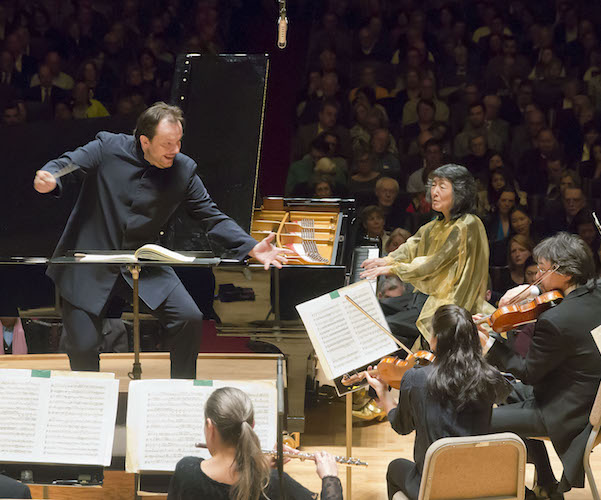Concert Review: Andris Nelsons conducts Mozart and Bruckner
Mitsuko Uchida is quite possibly the finest Mozart pianist around today, at least among non-period specialists.

Andris Nelsons leads the Boston Symphony and pianist Mitsuko Uchida. Photo: Winslow Townson.
By Jonathan Blumhofer
Anton Bruckner doesn’t seem to be everyone’s cup of tea: “We needed more Mozart and less Bruckner,” one patron exiting Symphony Hall on Saturday night grumpily noted. And I heard a few other comments to similar effect while leaving the hall. Of course, maybe such sentiments owed more to Mitsuko Uchida’s ravishing performance of Mozart’s D-minor piano concerto on the concert’s first half than anything else. But the fact remains that there were noticeably more empty seats for Bruckner’s Sixth Symphony than there had been for the Mozart.
And that’s a shame. Not only is the Sixth a great piece – its slow movement is on par with any by Brahms or Tchaikovsky – but it’s rarely played and this weekend’s performances possessed all the ceremony and excellence you’d want it to get in its once-a-decade-or-so trot around the pasture.
Andris Nelsons, who’s just begun recording a Bruckner cycle with the Gewandhausorchester Leipzig, deserves much of the credit for this. He clearly gets and loves the piece: Saturday’s performance was firing on just about all cylinders.
Interpretively, it was smartly paced and clearly shaped. There was no unnecessary lingering over some spots at the expense of others. Rather, everything was coherently weighted, from the Symphony’s many undulating, mysterious string arpeggios to its heroic brass chorales. There was personality to spare, too, especially in the rollicking Scherzo with its rather inebriated Trio. And the searing Adagio sang with terrific intensity and sumptuous beauty.
The outer movements gave the Boston Symphony Orchestra (BSO) brass plenty of moments to shine and, even if things got a bit raw by the finale, they threw up magnificent walls of burnished sound throughout the night. Indeed, if you revel in that sort of thing (and I do), there was much to delight in, most of all the excellent command of textural balances Nelsons drew from that section of the orchestra.
The rest of the ensemble acquitted itself grandly, too. As in most Bruckner, the strings aren’t always front-and-center in the Sixth. But there was plenty of insinuating purpose to be gleaned from their more-accompanimental gestures on Saturday, especially during those all-important outer movements. And the woodwind playing was, as a general rule, warm and inviting, nowhere more so than during John Ferrillo’s melting, second-movement solos.
So why the signs of post-concert Bruckner hostility? I’m not totally sure. Yes, the Sixth is a weird piece and it’s not short. Bruckner had his own way with symphonic forms and this one jumps about in sometimes neck-straining fashion. And his reputation as an eccentric composer persists.
But swap out “eccentric” for “visionary” and you’ve pretty much got the descriptor for Saturday’s performance. This is forward-looking music and, in Nelsons’ and the BSO’s collective hands, it sounded like it.
The Mozart performance that came before it was good, very good. It didn’t hurt that the Piano Concerto no. 20 is one of the high points of his catalogue. But it was even better that Mitsuko Uchida played the daylights out of it. Simply put, she’s quite possibly the finest Mozart pianist around today, at least among non-period specialists, and Saturday’s performance demonstrated why.
In a word, her playing was irresistible. Everything sounded great: Uchida’s famous pearly tone was on display throughout. It was also phrased with compelling thoughtfulness. The way she held back the opening gesture of the finale’s first theme, for instance, wasn’t merely an affective device. Rather, it was rhetorical: a useful attention-getter as well as an anticipation of the expressive turbulence to come – not to mention a propulsive wind-up for the music that immediately followed.
Above all, Uchida’s reading embraced the music’s drama, be that in the aphotic first movement or during the several stormy cadenzas. For the latter she aptly used Beethoven’s: this is a piece that, for the most part, takes an expressive angle that far exceeds the Classical style, and the accord between Mozart’s writing and Beethoven’s (in the cadenzas) is remarkable. Of course there’s also the beautiful slow movement, which could come from no other composer or time, that, on Saturday, was simply lovely.
Nelsons and the BSO accompanied Uchida deftly, especially in that middle movement. The ovation that greeted the end of their performance was blazing and immediate – as tremendous as it was deserved.
Jonathan Blumhofer is a composer and violist who has been active in the greater Boston area since 2004. His music has received numerous awards and been performed by various ensembles, including the American Composers Orchestra, Kiev Philharmonic, Camerata Chicago, Xanthos Ensemble, and Juventas New Music Group. Since receiving his doctorate from Boston University in 2010, Jon has taught at Clark University, Worcester Polytechnic Institute, and online for the University of Phoenix, in addition to writing music criticism for the Worcester Telegram & Gazette.
Tagged: Andris Nelsons, Boston Symphony Orchestra
